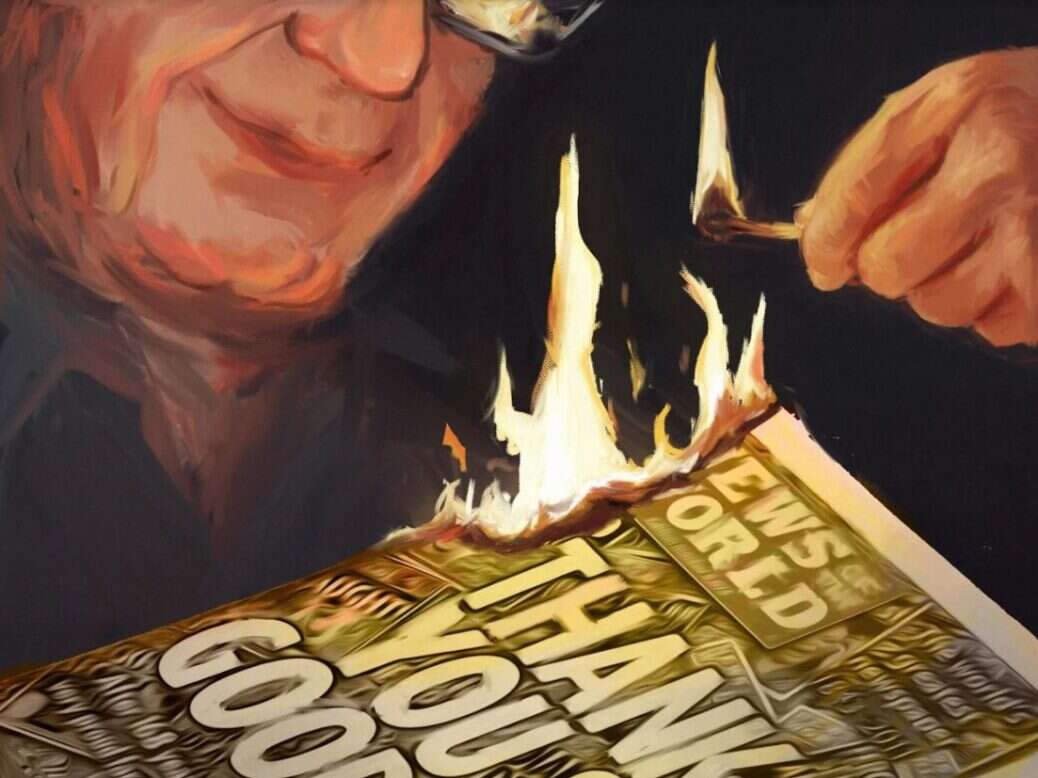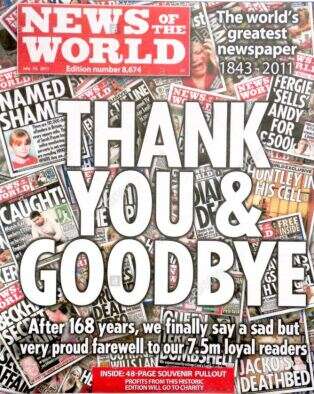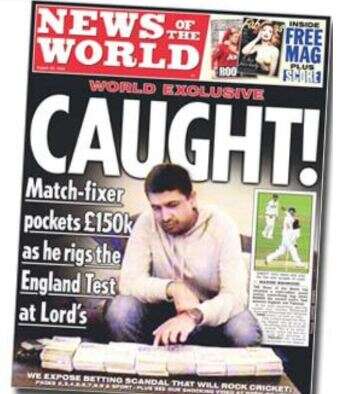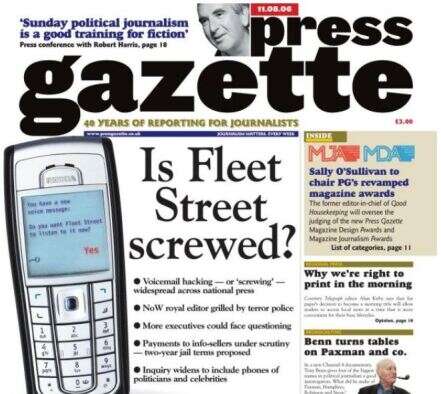
Ten years ago this week, during the height of the phone-hacking scandal revelations, the News of the World printed its final edition.
This week I spoke to former NoW insiders and other sources central to a story that gripped the nation through the summer of 2011 including Nick Davies, the now-retired Guardian reporter who broke the hacking scandal.
His years-long investigation culminated on 4 July 2011 with a front-page revelation in The Guardian that the NoW had hacked the voicemail messages of missing schoolgirl Milly Dowler. The newspaper printed its last edition six days later.
I asked Davies what the impact has been of his investigation ten years on.
“Nothing important has changed,” says Davies. “I suspect it’s true that criminality committed by Fleet Street newspapers has fallen to zero, or near zero.
“But what we didn’t achieve was the creation of a decent press regulator. The most important thing about a decent press regulator is that publishers would be required to abide by its first clause, for members to correct anything false and misleading they published. If that had been in place we wouldn’t have left the European Union.
“Public debate continues to be polluted by false and misleading information. Some titles at the dark end of Fleet Street remain a distortion of what journalism should be.”
While the views of Davies are likely at odds with many who work in the tabloids, former NoW staffers interviewed by Press Gazette agreed with him on one thing: that Murdoch was wrong to close the paper.
Davies says: “It was a typically cynical and opportunistic act by the Murdochs. We know this because of the emails that were disclosed at the time of the hacking trial. They wanted to move public opinion on in a way that would allow them to complete the takeover BSkyB. It wasn’t because of the boycott by advertisers – it was simply about greed.”

News of the World closure a ‘huge, huge blow’ to the industry
The final edition of the News of the World, printed on 10 July 2011, sold 3.8m copies. On an average week, even while in decline in 2011, it was selling 2.6m. That’s more than the combined sales today of every Sunday newspaper currently audited by ABC.
Following that 4 July Guardian front page, there was a storm of outrage and a campaign on Twitter that led to a host of major advertisers leaving the NoW. Just three days later, News Corp Europe and Asia chief executive James Murdoch announced that Sunday, 10 July, would be the last edition of the paper some 168 years after its launch.
A former NoW executive who declined to be named said: “It was the early days of social media and they misinterpreted anger on social media as being public anger. In retrospect, it was a lot of left-wing opinion rather than the general public.
“It was a targeted bombing raid against the News of the World brought about by a set of unfortunate circumstances we found ourselves in. It was the first example of what we now call cancel culture.”
Their feeling was that Murdoch could and should have ridden out the storm given the subsequent revelations that hacking was even more prevalent at the Mirror titles.
One former senior News of the World journalist who still works in the national press said the 2011 News of the World team were unfairly made to pay the price for the sins of the previous regime.
“By 2011 everyone was already being really careful, and they are even more careful now. Hacked Off has won. You hardly ever get any big exposes because most are argued out on privacy grounds. The [Matt] Hancock story shows the transformative power of a big tabloid scoop – it can set the agenda for days and change the country for the better.
“Those were the sort of stories that the News of the World would break every week.
“James Murdoch bounced the board into closing the newspaper and Rupert Murdoch realised it was a big mistake but too late.
“The closure of the News of the World must have taken £4m or £5m a year out of the market [for stories and pictures].
“It was a huge, huge blow to our industry.”
Update 9/1/21: Hacked Off said the above was a “false and unsubstantiated characterisation” of the group.
It said: “Hacked Off has long campaigned for Leveson’s reforms to be brought into effect, including on costs-shifting and compulsory arbitration in media cases, which would give newspapers more protection than ever before in holding the wealthy and powerful to account.
“Fault for any decline in investigative journalism in recent years lays at the door of the Government and national newspaper owners, who have rejected the Leveson system and the legal costs-shifting protections it promised to provide, and aggressive cost-cutting measures across the industry which have led to fewer journalists and lower editorial budgets.
“This attitude of many owners – driven by a desire to preserve profit margins at all costs – is characterised by News UK’s closure of the News of the World, which had the appearance of a calculated strategy to sacrifice one title (and hundreds of journalists’ jobs), in order to avoid the meaningful corporate governance reform which is so clearly necessary. It is regrettable that, as a consequence, UK citizens have access to one fewer newspaper, many journalists lost their jobs, and the necessary reform has still not happened.”
The Guardian’s hacking revelations were strongly focused on the News of the World, and information about the left-leaning Mirror came later. Davies (pictured above giving evidence at the Leveson Inquiry) rejects any suggestion that his reporting was politically motivated.
He says: “The difference between the News of the World and the Mirror was Glenn Mulcaire’s notebooks. Because those notebooks survived and were in the custody of the police you had evidence to prove this went on.
“From my own view if I could have found evidence in relation to the Mirror group that was equivalent to Glenn Mulcaire’s notebooks I would have published it. The story went where the evidence allowed us to go.”
Sacked News of the World staff feel stigmatised
For media reporters like me, it was galling back in 2009 and 2010 to be told by News of the World insiders that phone-hacking was confined to one rogue reporter. In the end, eight further News of the World journalists were convicted of phone-hacking, including former editor Andy Coulson.
One former News of the World senior staffer said: “The whole thing was quite traumatising for a lot of people and many feel they were unfairly stigmatised”.
They insisted that most at the News of the World were ignorant about the extent of phone-hacking and that their denials were genuine.
“Of course there were suspicions but you can’t just fire people if you have no hard evidence to back that up. Let’s be realistic – the people who had been involved were not going to voluntarily incriminate themselves. All the hard evidence was in the hands of the Met Police under lock and key at the Yard. It wasn’t like it was sitting around Wapping waiting to be found.”
They agreed with Davies that the closure of the News of the World made sense to the News Corp board “for quite cynical reasons”.
“It made good crisis PR sense. In a very cold and brutal way it enabled them to draw a line under it.
“It also made commercial sense because the News of the World was seen internally as ‘the ginger stepchild’ of the group. No one in commercial or marketing really warmed to it because it was a hard sell alongside The Sun.
“They would rather sell advertising across a seven-day operation rather than having two different sells with a very different style of content.
“At the time of the closure, there were already plans for a seven-day operation with The Sun but the move would have been very gradual – with sport and subbing merging first.
“Closing the News of the World enabled them to reduce the costs in one fell swoop. But it created a narrative that said all of the ills of Fleet Street were contained in the News of the World. That was brutally unfair on most of the 200 members of staff who had nothing to do with phone-hacking and were appalled by it.
“It was still the most popular newspaper in the country and people really looked forward to reading it as regular fixture of their Sundays.”
They said most former News of the World staffers have “found other work and done okay”.
“The News of the Word was a tough, competitive and very professional environment and you had to be talented to work there. People have put those skills to good use.”
They added: “The closure of the News of the World was a disaster for readers, a disaster for the members of staff thrown out on to the street and a disaster for the industry. But it was a wonderful outcome for all the crooks, cheats and charlatans who would otherwise have been exposed by the paper.”
Included on the list was the paper’s 1986 exposure of Conservative Party deputy chairman Jeffrey Archer attempting to buy the silence of prostitute Monica Coghlan. It exposed Archer as someone who had lied in court, prompting him to go to prison, and overturned a previous £500,000 libel settlement won from the Daily Star.
Its 2010, exposure of Pakistan cricketers working with betting syndicates to rig an England test match was another example of the paper’s extraordinary investigative power.

Missed opportunity to settle
Alongside Nick Davies, the person who probably did the most to (unintentionally) bring down the NoW was lawyer Mark Lewis who brought the first hacking claims against the paper.
Like Davies, he feels the scandal was a missed opportunity to reform press regulation.
“The Leveson Inquiry didn’t really achieve anything. The main recommendations weren’t implemented, Leveson Two [intended to investigate relations between journalists and the police] never took place, and things drifted on.
“IPSO is better than the PCC, but it’s not miles better. I wouldn’t recommend clients to go to either regulator. You have one which is ineffective and one which seems only regulate left-wing media.”
Lewis negotiated the £700,000 Gordon Taylor phone-hacking settlement, details of which were reported by The Guardian in July 2009, starting two years of revelations by the paper which culminated in the 4 July Milly Dowler story.
I asked Lewis whether the NoW brightly took all the blame for phone-hacking and whether Murdoch was right to close it.
Lewis, who represented footballer Garry Flitcroft in his privacy litigation against the Sunday People in 2001, believes phone-hacking began there (the company was then called Trinity Mirror but is now Reach). And he noted that it was a widespread practice not confined to the News of the World.
In 2006, immediately after the first phone-hacking arrest, Press Gazette reported sources saying phone-hacking was “extremely prevalent” across Fleet Street – especially on Sunday tabloids.

A 2015 privacy judgment against the Mirror revealed industrial-scale voicemail interception at the Daily Mirror, Sunday Mirror and People, which prompted huge distress among its targets. BBC executive Alan Yentob was hacked twice a day from 1999 to 2006.
Lewis says: “I feel very sorry for the people that worked [at the News of the World] because a lot of people lost their jobs because of the actions of a few bad apples.
“That was really unfair to them. But I didn’t feel sorry for the owners. The owners actually made a lot of money out of it – some of it from the sale of 21st Century Fox, and some from the cost-cutting that ensued.”
Lewis believes Murdoch actually profited from the hacking scandal long-term:
“Because the consequence of the phone-hacking scandal was to force News Corp to split from Twentieth Century Fox which became 21st Century Fox. The film division trebled or quadrupled in value because US investors were no longer bothered by English newspapers dragging the company down.”
In 2019 Disney paid $71.3bn for Fox.
Lewis said it was also disgraceful that News International (now News UK) delivered all the information about its sources to the police – effectively betraying journalistic protection of sources in order to protect the bosses.
This prompted Operation Elveden, which led to 34 journalists being arrested and/or charged with conspiracy to commit misconduct in public life (but only one – Dan Evans, who admitted the offence) was convicted.
Some 30 public officials were convicted of selling stories to The Sun and News of the World, with many losing their jobs and life savings and spending time in jail.
The false hope claim and the mistake over the deletion of messages
The original Guardian phone-hacking story contained one claim that was later corrected by the paper. It said: “The messages were deleted by journalists in the first few days after Milly’s disappearance in order to free up space for more messages.”
Many former News of the World insiders believe it was this charge which fanned the flames of public anger and prompted the closure of the paper.
Some argue privately that there was a public interest in listening to the messages because this could have helped find the missing girl.
But this version of events discounts the fact that police were already monitoring the child’s phone. By listening to the voicemails, the journalists were interfering with a police investigation and potentially disrupting the chain of evidence.
It is now believed that the voicemail messages may have been automatically deleted by the phone company. But this does not change the fact the NoW’s actions could have given the Dowlers false hope that their daughter was alive. Sally Dowler had been calling her daughter’s phone but was unable to leave a message because the voicemail box was full. It could have been that by listening to messages the NoW freed up space – giving the impression that Milly had been accessing her voicemails.
The NoW only went to the police with the voicemail evidence after it had followed up a false lead arising from the hacked messages.
Hacking trial judge Justice Saunders said: “That was unforgivable. The fact that they delayed telling the police of the contents of the voicemail demonstrates that their true motivation was not to act in the best interests of the child but to get credit for finding her and thereby sell the maximum number of newspapers.”
Among the wider journalistic community there are mixed feelings about the News of the World ten years on.
Responding to a discussion I started on Facebook, journalist Karen Hockney said: “I worked for NoW features on a freelance basis for a couple of years when I left The Sun in ‘94. It was a brilliant old school newsroom with lots of buzz and banter. I was given free rein to set up a gloriously varied range of mainly celeb interviews and features, was paid fantastic rates and was always treated with respect by Piers, Rebekah and the team. Mistakes were made but it really felt like the end of an era when it closed. And it’s been downhill for print journalism ever since”
But former Standard journalist Mick Dennis offered a bittersweet epitaph for the title. “I miss the NoW. Week after week it had genuine scoops. But all those years at Murdoch’s red tops, when fear ruled the newsroom and the end (the story) justified any means, led to our entire industry being regarded as crooks and liars.”
News UK declined to comment, but instead pointed me to James Murdoch’s statement from 7 July 2011 when he said: “You may see these changes as a price loyal staff at the News of the World are paying for the transgressions of others. So please hear me when I say that your good work is a credit to journalism. I do not want the legitimacy of what you do to be compromised by acts of others. I want all journalism at News International to be beyond reproach.”
(Main illustration: Eloise Fabre)
Email pged@pressgazette.co.uk to point out mistakes, provide story tips or send in a letter for publication on our "Letters Page" blog
